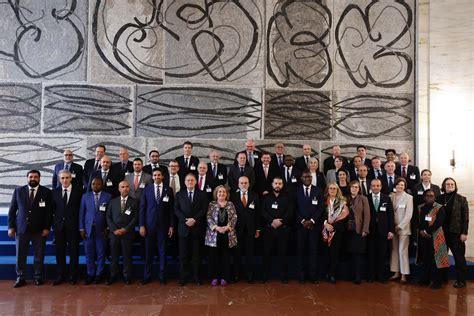
Defeat-ISIS Coalition Meets in Italy – Reaffirms Commitment to Continued Fight
A meeting of the Small Group of the Global Coalition to Defeat ISIS concluded in Rome on Tuesday.
The meeting focused on “collective efforts to counter ISIS in northeast Syria, Iraq, sub-Saharan Africa, and Central Asia,” according to a statement released by the group at the end of their conference.
The statement, along with the meeting itself, confirmed the ongoing commitment of the U.S., along with the major European powers, to the continued fight against the terrorist group.
“The Global Coalition to Defeat ISIS remains united and resolved in its determination to ensure the enduring defeat of ISIS wherever it attempts to operate and to hold ISIS terrorists accountable under criminal justice systems,” the statement concluded.
Indeed, the meeting follows two recent high-profile attacks claimed by ISIS, after an extended period of quiescence, as well as an apparent ISIS resurgence in Iraq, as well as Syria.
These developments underscore the significance of warnings from the Kurdistan Regional Government (KRG) that ISIS remains a threat—despite the nine years that have passed since the U.S. first led the formation of the Defeat ISIS Coalition under former President Barack Obama.
Paris Attack
On Saturday, a 26-year-old French man, Armand Rajabpour-Miyandoab, went on a rampage, killing one man and wounding two others. Seven years before, in 2016, he had been arrested for planning a terrorist attack. He was found guilty then and served four years in prison.
Rajabpour-Miyandoab has an “acute mental illness,” French authorities said after Saturday’s attack.
Indeed, following his release from prison, he received treatment, while he lived with his parents—refugees from Iran who fled after the 1979 revolution. In October, his mother warned the police that her son was not well, but they did not find enough cause to detain him.
Rajabpour-Miyandoab converted to Islam at the age of 18, French authorities said. Apparently, his parents are not Muslim, and he was not raised as a Muslim.
His conversion was prompted by on-line communications with an ISIS supporter, and with his conversion, he embraced ISIS’s ideology and a radical form of Islam.
Just before the attack, Rajabpour-Miyandoab posted a video to social media, in which he pledged his allegiance to the terrorist organization.
After the attack, he was quickly arrested. Under questioning by French police, he said that the killing of Muslims in Afghanistan and Gaza had made him angry, while he charged that France was complicit.
Whatever he may have thought about Gaza, he seemed not to understand that no Western troops were in Afghanistan now..
Philippines Attack
The following day, on Sunday, a bombing occurred at a Catholic Mass in the southern Philippines, which has a large Muslim population, in a country that is predominantly Catholic. The bomb killed four people and wounded 50 others.
The attack occurred in a university gymnasium in the city of Marawi, the capital of the province of Lanao del Sur, where authorities had been conducting military operations against pro-ISIS groups.
In 2017, a protracted conflict occurred in that area between those groups and the army. It lasted five months and caused the death of over one thousand people.
Referring to Sunday’s attack, the head of the Philippines’ Armed Forces, Romeo Brawner, said that it was, possibly, “a retaliatory attack” for the army’s operations against the insurgents.
Iraq and Syria
Although the U.S. declared the territorial defeat of ISIS in Iraq and Syria already in 2019, the terrorist organization remains an active threat which requires regular military operations to keep it in check.
Indeed, ISIS attacks are increasing in Iraq. Thus, on Sunday, a commander of the Kurdish Peshmerga forces, Brig. Gen. Mardan Salah, told Kurdistan 24 that it was necessary for the Iraqi Army and the Peshmerga to cooperate more closely in the disputed territories amid “renewed attacks” from ISIS.
Conflict also continues in Syria. Most of the fighting with ISIS has been with the Kurdish-led and U.S.-backed Syrian Defense Forces (SDF), the civilian branch of which administers northeast Syria.
However, In early November, ISIS attacked forces further to the west, in the Syrian desert, which were aligned with the Syrian regime, killing some 30 people.
It was “the most violent attack in months,” according to the British-based Syrian Observatory for Human Rights, and it was followed by an attack in late November, in which ISIS killed another 16 soldiers of the Syrian regime, while it wounded 27 others.
Source » kurdistan24.net





